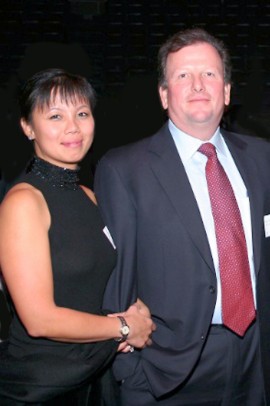$6.5M gift to create ‘biotechnology powerhouse’
The largest gift ever received by the College of Engineering was given by one of its first bioengineering graduates to develop UIC as a “biotechnology powerhouse.”
The $6.5 million pledge from Richard S. and Loan B. Hill to the department of bioengineering, housed in the colleges of Engineering and Medicine, brings the couple’s total giving to UIC to nearly $9 million.
“Chicago can fulfill aspirations to be thought of in the biotechnology sector in the same vein as the Silicon Valley is with the semiconductor sector,” said Hill, a 1974 bioengineering graduate.
“There is tremendous potential for UIC to partner with private-sector resources, the state and the city.”
Other donations from the couple to the College Engineering have been used to established professorships and scholarships and support faculty research.
“Informed and visionary leadership from our alumni and friends, such as we receive from the Hills, will help this young campus make its maximum impact in the city, the state and the world,” said Chancellor Paula Allen-Meares. “The Hills’ gift is one generation putting the pieces in place for the next generation.”
The newly configured department, named the Richard and Loan Hill Department of Bioengineering, is the first named department at UIC.
One of the nation’s first degree-granting bioengineering programs when it opened in 1965, the department enrolls more than 100 doctoral, 50 masters and 250 undergraduate students.
“The Hills’ gift comes at a critical time following the recent re-positioning of bioengineering within both the colleges of Engineering and Medicine,” said Peter Nelson, dean of the College of Engineering.
“Mr. Hill’s generosity will enhance our commitment to translational science and will foster increased cooperation between engineering and medicine to solve complex biomedical problems,” said Dimitri Azar, dean of the College of Medicine.
The bioengineering department includes the emerging areas of neural engineering, computational systems biology, biomolecular engineering and regenerative medicine, new medical imaging and visualization technologies.
Research includes the development of an early diagnostic tool for glaucoma and the use of manmade quantum dots in studying cancer.
The department has 21 core faculty and more than 70 adjunct faculty in six colleges, as well as ongoing collaborations with other institutions.
Its research “shows great promise for solving complex biomedical problems, from novel methods of cancer diagnosis and prognosis, to early glaucoma detection through an electrode-array fitted into a contact lens,” said Thomas Royston, professor and head.
University and government leaders praised the gift’s potential to benefit the region’s economy.
“This 21st-century approach will boost Illinois’ position as a key hub in this growing arena,” said Gov. Pat Quinn.
“UIC, with its colleges of Engineering and Medicine, has a unique combination that can help propel this economic engine for the future, and I am excited at the possibilities and potential of this gift,” said Mayor Rahm Emanuel.
Hill built a successful career as a pioneer in the use of semiconductors, with engineering and management positions at Hughes Aircraft, Motorola and General Electric. In 1993 he became CEO of Novellus, a small start-up semiconductor capital equipment company in Silicon Valley. He led Novellus to become one of the top 10 semiconductor equipment manufacturers in the world, retiring in June 2012.
Hill is past chairman of the University of Illinois Foundation Board, former chairman of the College of Engineering Advisory Board and a member of the Board of Visitors of the Urbana-Champaign College of Engineering.
He received an honorary doctorate from UIC in 2008.
“The Hills’ gift is coming to the right place at the right time because we can build on our existing departmental strengths to grow in ways that support evolving needs in health care and medicine,” Royston said.
“Chicago is both a leading academic medical destination and has a biotechnology business base poised to expand with the public and private investment that’s projected over the coming decade.”

